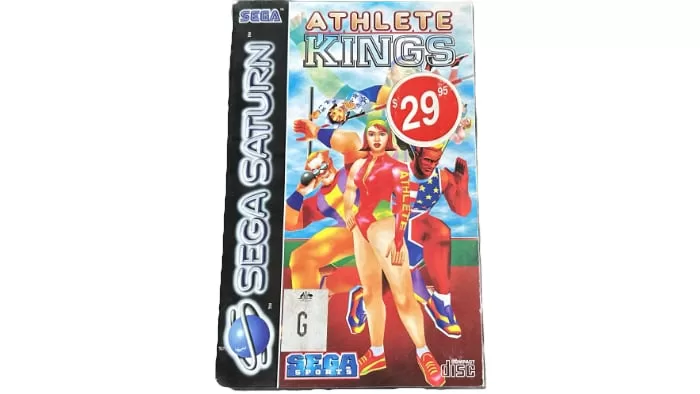
Who’s up for a little gamepad and thumb-destroying action?
In Retro Game Of The Week I pull a game from my collection and write about why it’s important or interesting. Or in some cases, badly dated and rubbish.
As regular listeners to Vertical Hold (you are a regular listener, right?) will be aware, sports are not really my thing. Yes, I know, UnAustralian and all that… sigh.
However, while I’m not into too many traditional sports, sports through video games are another matter entirely.
Back in the day — and I’m talking the 1980s here — there were plenty of games that tried to replicate a single sport with varying degrees of success. Is there anyone from that era that didn’t play International Soccer on a C64 cart at some point? I think not.
However, if you wanted more than one sport, you had to make a sacrifice. The gaming gods demanded blood, or to be more accurate, they demanded destroyed joysticks and buttons. Games like Konami’s Track and Field or Daley Thompson’s Decathlon were a lot of fun to play, but they weren’t half brutal on the hardware needed to play them.
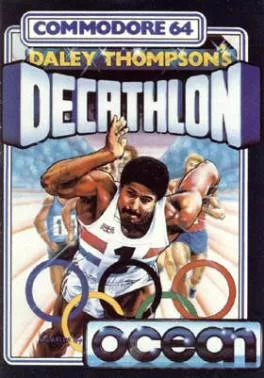
Ah, Daley Thompson. I don’t think too many sports people grow quality moustaches like that any more. (Image via Wikipedia, fair use licence)
While that style of rapid fire joystick twiddling was popular amongst teenage boys at the time (honestly, the jokes write themselves, don’t they?), it wasn’t a gameplay mechanic that really suited too many other games beyond, say, Combat School. Which was more or less Decathlon with a military theme anyway.
As such, by the mid-1990s, it felt very much like a dated gameplay idea that had come and gone.
Enter DecAthlete… or, as I first knew it, Athlete Kings, because that was its European title, and at the time (and for some time afterwards) Australia was effectively a European territory for most games releases.
There’s vague online mention of the name change being due to a licensing issue. I wonder if Daley Thompson got there first? But I digress…
DecAthlete/Athlete Kings gives you 10 events to play through single player or against a human opponent. Take my word for it, play against the human every time.
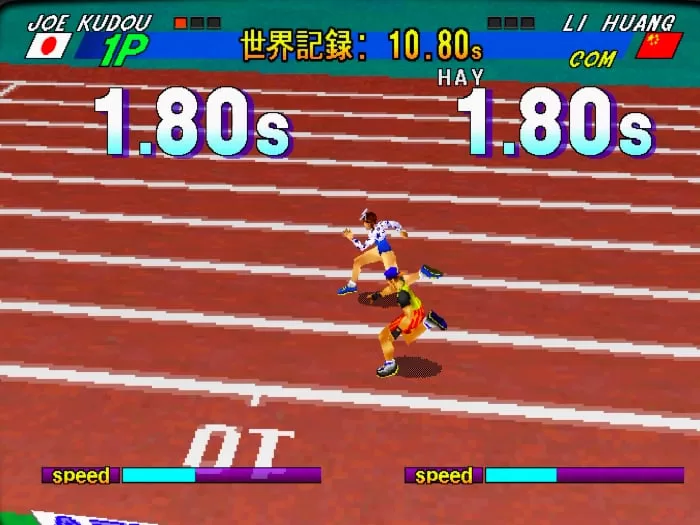
Play with your friends. And then afterwards, maybe some video games, ho ho.
Every single drop of affection I have for this game is because it became the centrepiece of a heated rivalry between me and one of my friends once I had a copy.
Event records were saved — I still have them on a Saturn backup cartridge to this day — and it was agreed that I wouldn’t play extra rounds of Athlete Kings unless he was present to prevent “cheating”.
Just playing through a little of it this week felt like I was breaking that promise, although I will say to said unnamed gentleman (he knows who he is, let’s just call him “V”) if he is reading this that my skills have atrophied a lot.
Also, like most competitive games of this type, there’s less of a thrill in playing by yourself just to beat run, throw or jump records.
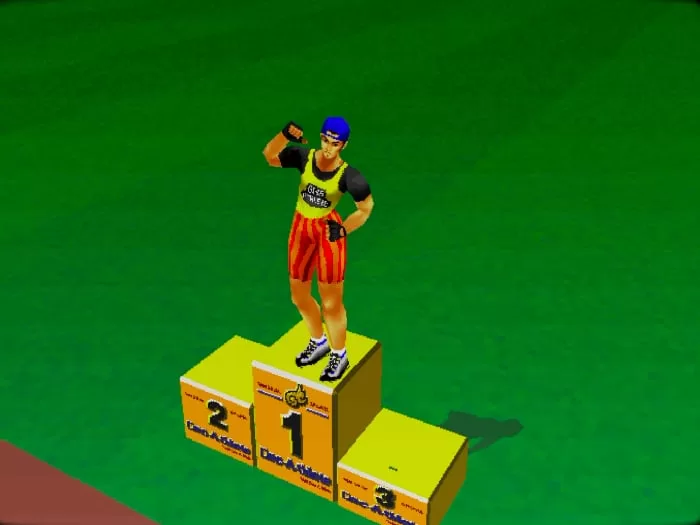
I’m a winner! Look at all these chumps I beat!
Actually, I have affection for this game not just because of nostalgia, but also because it gets the “fun” aspect of a video game so very right, even if you’re not particularly sports-obsessed.
About the same time, Konami did have its own PlayStation take in the form of International Track & Field (and a sequel), but those played their events very straight indeed. As a result, they’re a little bland and lifeless, even when you look past the limitations of early polygon graphics.
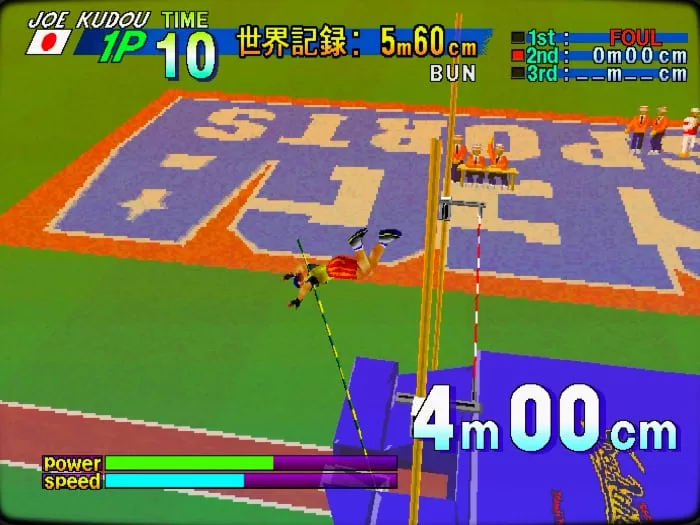
This is going to HURT.
Whereas DecAthlete/Athlete Kings is bright, joyous and silly, with a cast of ridiculous national stereotypes — including a very clear and obvious British Daley Thompson caricature — and some really fun animations when you win or even if you lose.
I hadn’t realised for many years that DecAthlete started its life as an arcade machine, and to this day I’ve never seen one of those in the wild. Sega very smartly made the decision with the Saturn port to restrict basically nothing in terms of events, so you don’t have to — as you apparently do for the arcade version — hit specific times or distances for any event.
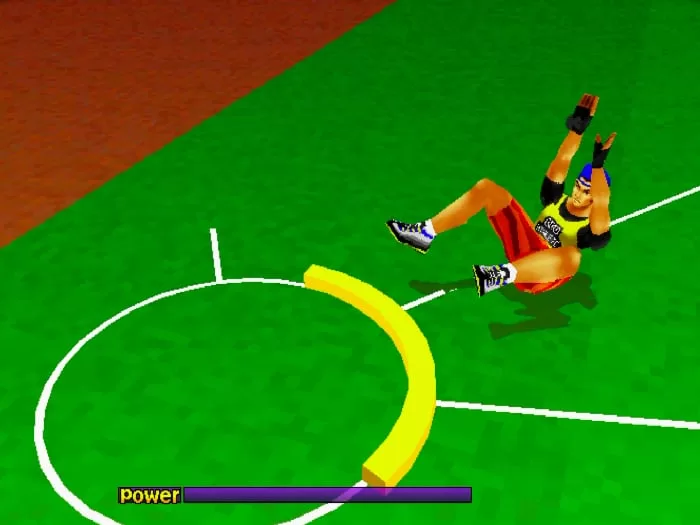
Is there a rule that says you can’t throw yourself as well as the shot put? There is? Oh. Damn.
Why does that matter? Because it means even if you stuff up and drop your thrown object or stumble over every hurdle, it’s easy to laugh it off and move onto the next event. It reduces friction and keeps you playing — and having fun.
It is a pity that it doesn’t allow for more than two players, but that’s just the way it was for so many games (excluding Bomberman) back then.
How to play DecAthlete/Athlete Kings now
So, I mentioned that my first exposure to DecAthlete was via its PAL Saturn version as Athlete Kings. Here’s that copy, still with price I paid for it stuck on:

That was $29.99 very well spent.
However… I do have to be honest here, because it’s not the only copy I own.
I also have a Japanese copy of DecAthlete.
Why?
Well, I’ll let the price sticker tell the story here.
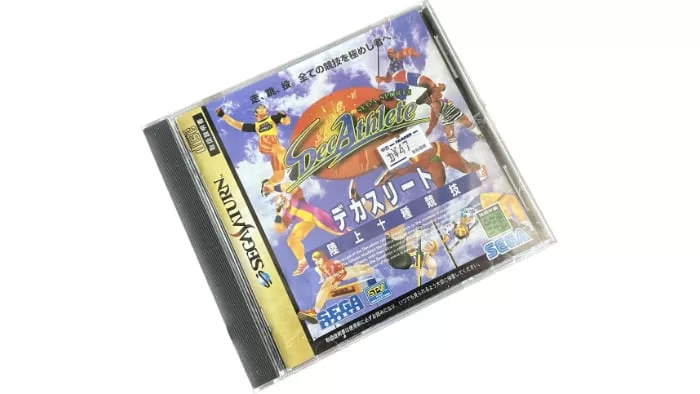
Yeah.
47 yen, or about 52c at current exchange rates.
You would, wouldn’t you? I certainly did.
That does give quite the price range, mind you. My PAL copy has been mine since the late 1990s, while I’ve had that Japanese copy for about 7 years now, give or take.
I was curious to see what copies go for now on the open market.
It does depend on what you want. DecAthlete copies run anywhere from $20 to $200 on eBay, though those cheaper copies do tend to more be Japanese copies, while US copies run a little pricier.
If you want Athlete Kings, it’ll run you somewhere between $20-$40, though that price range does include some disc-only copies.
But there is a version I don’t have. I’m not so much thinking about its sequel, Winter Heat, but instead the PlayStation 2 port of Athlete Kings.
That was Japan-only, and if you want one of those, eBay prices seem to run somewhere between $30-$60.
